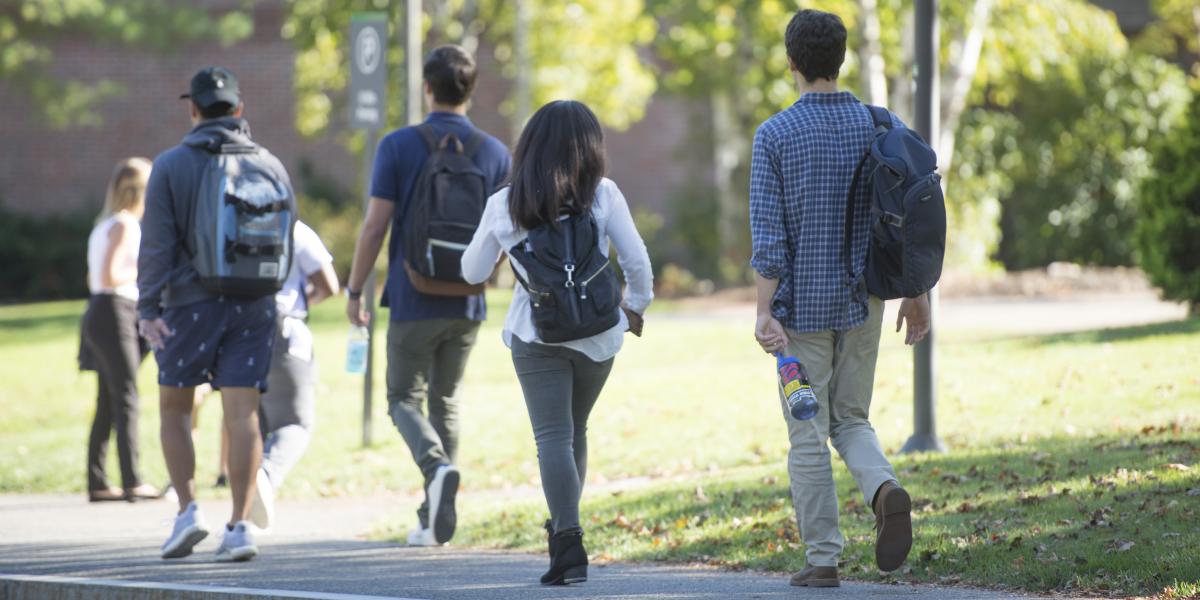Navigating the U.S. Cultural Climate

Race was something that Lisa Litvinava had never really thought about until she came to the United States. As a native of Belarus, everything she thought she knew about race, she had seen on TV.
“You think race and racism are very distant from you, even though they’re not,” she says.
Litvinava first encountered the concepts of race, racism, and privilege as an international student at Babson College in Wellesley, Massachusetts. She worked as a program assistant in the Glavin Office of Multicultural and International Education, where she was challenged to think about her own cultural identity and what that meant in the U.S. context.
“When I got to this country, I did not think of myself as a white person,” Litvinava says. “This identity was given to me just because of my skin color. I met people [at Babson] who were constantly pushing me to talk about this. At first I was uncomfortable, and then they started to push me to understand that the world is much bigger than you think, and here in this country, it’s not so much what you think you are, as how people see you.”
Narratives of the Past and Present
Babson College, one of the recipients of the 2018 Senator Paul Simon Award for Comprehensive Internationalization, has made a concerted effort to foster campus conversations about culture, identity, and diversity through its innovative model of bringing together multicultural and international education. Last year, Babson developed a three-part workshop on race and racism in the United States for its 1,800 international students—who make up more than half of the college’s total student population.
“At first I was uncomfortable, and then they started to push me to understand that the world is much bigger than you think, and here in this country, it’s not so much what you think you are, as how people see you.” —Lisa Litvinava, Babson College student
“When we prepare our domestic students to go abroad, we give them a lot of training on cultural competency,” says arts and humanities professor Elizabeth Swanson. “It struck us, particularly with this current political and racial climate, that we really weren’t doing that work for our international students when they arrived.”
Following the election of President Trump in November 2016, faculty and staff recognized that international students were walking into a politically and racially charged environment that they may not fully comprehend.
“Not only around the election, but also the Black Lives Matter movement and changing terminology around gender identity,” Swanson explains. “We wanted them to feel comfortable and equipped to operate in this [cultural] context.”
Swanson worked with Glavin Office staff to develop the three-part program. The first workshop focused on definitions, looking at biologically determined and socially constructed ideas of race, as well as how to use inclusive and respectful language. The second part of the series was built on the idea of historical literacy, outlining key movements and developments in U.S. history through concepts such as citizenship.
“I really try to get into the history of race in this country, how it is not an aberration to experience racism,” Swanson explains. “It’s really about how those historical moments inform the contemporary struggle around racial justice.”
The final workshop outlined current events, such as Trump’s election, the controversy over athletes such as Colin Kaepernick taking a knee, and issues around Confederate statues. “It gives people a chance to really process what is happening,” Swanson says.
Culturally Critical Discussions
Other institutions are making strides to help international students better understand diversity, race, and racism in the United States. Some universities have built conversations about race, gender, and identity into an extended orientation model.
The Intercultural Center at Roger Williams University in Rhode Island, for example, partnered with the campus counseling center to develop Global Scholars, a noncredit first-year experience program that covers topics such as racism, xenophobia, macro- and micro-aggressions, and gender and sexuality, as well as issues related to U.S. higher education such as classroom participation and academic integrity.
The 18 international students currently enrolled in the program will receive a certificate upon completion at the end of the semester, says Cassidy Hammond, assistant director of international student and scholar initiatives. The students meet once a week for at least an hour to discuss a different topic. Experts from across campus are invited to join as guest speakers, including the chief diversity officer and the assistant director for queer and trans student initiatives.
“Last week we talked about what it’s like to come from a country in which many of our students are in the majority to being in the minority in this country,” says psychologist Kinneret Kandelker. “They are also learning about the cultural context and how they’re perceived, and what that means in relation to their own identity in their own country.”
“I think reaching out to the students and seeing what they’re struggling with and what they’re not understanding, first and foremost, before creating any kind of program, is vital.” —Cassidy Hammond
Hammond suggests surveying students about the issues they are facing and then using that feedback to develop a similar program.
“I think reaching out to the students and seeing what they’re struggling with and what they’re not understanding, first and foremost, before creating any kind of program, is vital,” she advises.
The Intersections of Identity
Zack Ritter, an adjunct professor who teaches social justice education at University of Redlands and the University of Laverne, completed his PhD at University of California-Los Angeles (UCLA), where he designed the curriculum for a noncredit class for international students titled “American Culture & Conversation.” Applying a critical race approach, he focused on topics such as U.S. holidays from the perspectives of race, gender, and class.
For Thanksgiving, he gave an overview of the holiday to the students, but then encouraged the class to “go deeper and talk about Native American history and genocide,” he says. “I wanted to present holidays, slang, American history, American politics, [and] American racism, sexism, classism in a real and raw way that could also be understandable for someone who’s not super familiar with [them].”
Another example is a three-day social justice retreat for international students at Oregon State University. Ismail Warsame, international student case manager, says the program is open to F-1 students as well as any other student who identifies as an immigrant. On the first day of the retreat, the group members share their immigration stories and discuss their various identities, including nationality, ethnicity, gender, and sexual orientation.
“We have them list all of the identities that are important to them,” Warsame says. “Then we ask them to eliminate two or three, just to show them how hard it is for people to suppress certain identities in order to fit in.”
The students are then introduced to concepts of gender, race, and identity in the U.S. context and are challenged to think about their own implicit and explicit biases. Warsame says that by the end of the retreat, the students report having a greater ability to understand some of the issues they encounter every day on campus. Staff also use the retreat as an opportunity to ask international students for feedback on what they need on campus.
One impetus behind Oregon State’s social justice retreat was its rapidly expanding international student population, which has increased from around 4 percent to almost 15 percent of its total student body in the last 10 years. The institution recognized that international students need to have the opportunity to participate in all aspects of campus life.
“There’s something really powerful for international students to be involved in this political climate and political moment in America and have these critical conversations.” —Zack Ritter
“Campuses are reaching critical mass of international students, but they’re not necessarily included in all facets of the university systems,” Warsame says. “A lot of universities are having those campus conversations on race and social justice. We also have to include international students.”
Ritter, who earned his doctoral degree at UCLA on racism and international students, agrees. He found that many colleges and universities were not effectively engaging international students in conversations about diversity and social justice through either cocurricular programs or in the classroom. He cautions that there is a lingering danger that institutions will point to international students as representations of campus diversity, while still overlooking historically underserved domestic populations. Nevertheless, he believes institutions need to create spaces to allow international students to engage with race, identity, and diversity—side by side with domestic students.
“There’s something really powerful for international students to be involved in this political climate and political moment in America and have these critical conversations,” he says. •
NAFSA Resources
About International Educator
International Educator is NAFSA’s flagship publication and has been published continually since 1990. As a record of the association and the field of international education, IE includes articles on a variety of topics, trends, and issues facing NAFSA members and their work.
From in-depth features to interviews with thought leaders and columns tailored to NAFSA’s knowledge communities, IE provides must-read context and analysis to those working around the globe to advance international education and exchange.
About NAFSA
NAFSA: Association of International Educators is the world's largest nonprofit association dedicated to international education and exchange. NAFSA serves the needs of more than 10,000 members and international educators worldwide at more than 3,500 institutions, in over 150 countries.
NAFSA membership provides you with unmatched access to best-in-class programs, critical updates, and resources to professionalize your practice. Members gain unrivaled opportunities to partner with experienced international education leaders.














